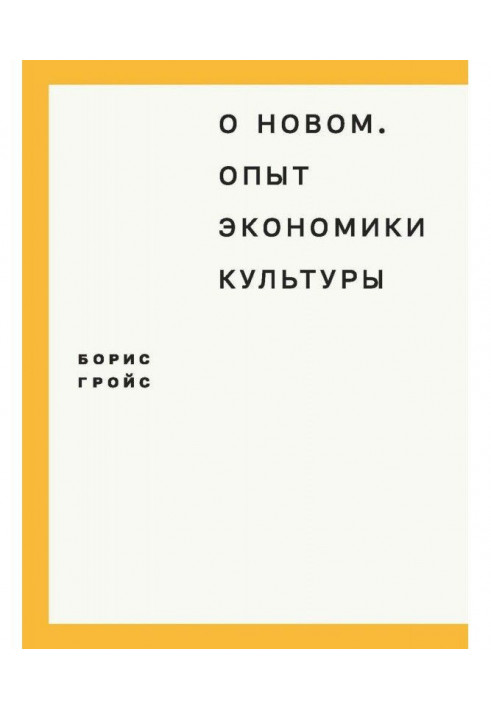Book About new. Experience of economy of culture
Coming from the maximum wide understanding of economy as exchange by values, Boris Гройс in the revolutionary book "About new" suggests to understand an innovation as act of the negative following of tradition, id est as a dialectical act of breaking/ of withholding of one or another historical form of production and exchange. The negative following of tradition, or creation of new works despite traditional standards, the banal translates and ordinary from the plan of daily occurence in a cultural context and changes to the same disposition old and new. Comes forward the ideal example of similar metamorphosis at Гройса of реди-мейд Marcel Дюшана, becoming in his book the standard of dialectics new and old, ordinary (banal) and cultural (valuable). The real edition is the first complete edition of book. Translation is collated by an author with the German original and plugs in itself specially written to them preface to Russian edition.
The book’s text has been translated from the original language using an artificial intelligence system. In most cases, the translation is accurate and clear, but occasionally there may be incorrect phrasing or individual words left untranslated.
- Name of the Author
- Гройс Boris
- Number of pages
- 124
- Language
- Ukrainian
- Cover
- Hard
- Age
- 12
- Release date
- 2015
Reviews
More books on this topic
Book Long twentieth century. Money,...
55 UAH
50 UAH
Book Notes on the fields of the "Name...
59 UAH
54 UAH
Book watercolor sketching
124 UAH
112 UAH
Book Mediterranean and Mediterranean...
112 UAH
101 UAH
Book Strategy of indirect actions
131 UAH
118 UAH
Book On other side of good and evil
88 UAH
80 UAH
Book Because it is a modern art!
122 UAH
110 UAH
Book Sapiens. Short history of humanity
118 UAH
107 UAH
Book Metaphysics
11 UAH
10 UAH
Book Human, too human. Book for free...
34 UAH
31 UAH
















11/14/2024
Вражаюча книга про економіку культури!
Борис Гройс у своїй книзі "Про новий" пропонує читачеві унікальний погляд на інновації та традиції в контексті економіки культури. Його концепція негативного дотримання традиції відкриває нові горизонти для розуміння того, як старі форми виробництва та обміну можуть трансформуватися в нові культурні цінності. Я вважаю, що приклад реди-мейду Марселя Дюшана, який Гройс використовує для ілюстрації своїх ідей, є надзвичайно вдалим і показує, як звичайні об'єкти можуть набути нового сенсу в культурному контексті. Книга написана зрозумілою мовою, і хоча переклад може містити деякі недоліки, загальна ідея та глибина думки автора вражають. Це видання стане справжнім відкриттям для всіх, хто цікавиться культурою, мистецтвом та економікою. Рекомендую всім, хто прагне розширити свої горизонти і зрозуміти складні взаємозв'язки між традицією та інновацією!